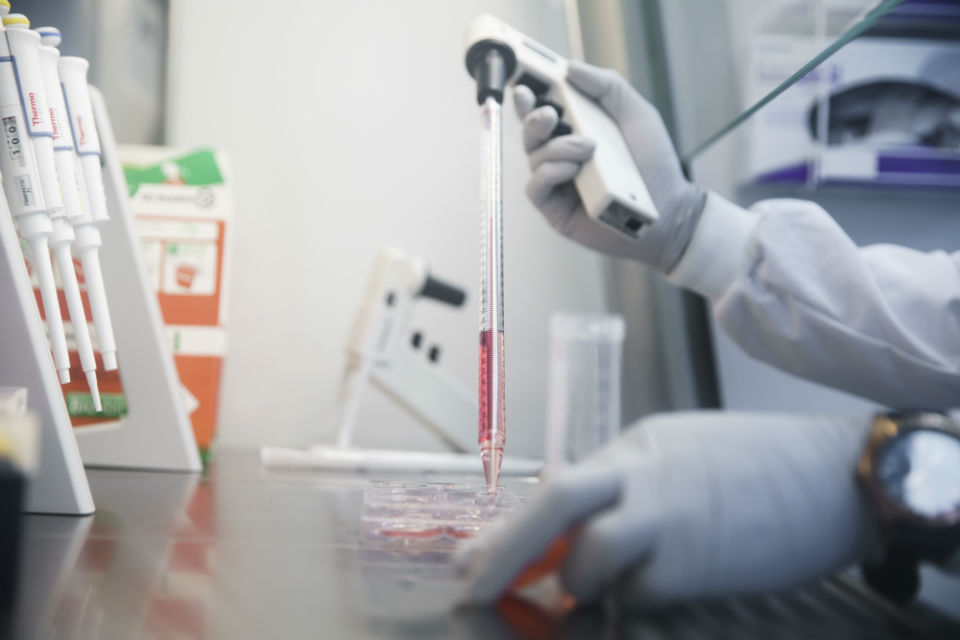‘Living medicine’ cancer therapy starts clinical trials
Pioneering treatment for multiple myeloma - partially-funded by an Innovate UK grant - reaches clinical stage.

Autolus Operations Assistant Precious Koko works at the laboratory in London.
London-based biopharmaceutical company Autolus is undertaking a novel cancer trial targeting T-cells.
Using CAR-T (chimeric antigen receptor T-cell) therapy, this ‘living medicine’ involves genetically engineering a patient’s own immune cells to improve their cancer-fighting properties and then reinfusing these cells back into their bloodstream.
It could offer new hope to people with multiple myeloma, which is the second most common blood cancer. Multiple myeloma is characterised by malignant plasma cells that accumulate in the patient’s bone marrow and produce abnormal proteins which can cause kidney problems, impairment of the immune system and further tumours to spread. There is currently no cure.
How it works
The study – which Autolus is calling APRIL – is for its AUTO2 product.
AUTO2 works by using a natural protein called APRIL ligand to target and bind with 2 cell receptors: B-cell maturation antigen (BCMA) and transmembrane activator and calcium modulator and cyclophilin ligand interactor (TACI).
Autolus believes that by adding APRIL ligand as a surface protein to the patients T cells it could improve the ability of the body’s own immune system to detect and kill cancer cells. This simultaneous dual-targeting could also minimise the risk of the cancer cells escaping capture and so avoid the patient’s disease from relapsing.
In the trial, patients with multiple myeloma will receive increasing doses of AUTO2. This will help to establish a recommended dose. It will then assess the safety, tolerability and clinical activity at this dose.

Testing at Autolus' laboratory.
Minimise the risk of the cancer cells escaping treatment
Dr Christian Itin, Autolus’ CEO said:
Breaking the defence mechanisms of cancers against T-cells is key to unlocking the curative potential of CAR-T cell therapies. AUTO2 is a first example of Autolus’ approach to specifically re-programme the patient’s own T-cells to minimise the risk of the cancer cells escaping treatment.
With the start of this study we have transitioned to a clinical stage company; an important step on our path to build a fully integrated autologous CAR-T cell company with a portfolio of differentiated therapies for the treatment of patients with cancer.
Supporting the development of CAR-T therapy
An Innovate UK grant partially funded some of the early work on AUTO2. Autolus was granted just over £1.48 million to test the effectiveness of patients T-cells to target multiple myeloma cells when re-engineered with the ligand that binds to BCMA and TACI. Evidence gathered here has directly contributed to progress the development of this product to clinical trials.
Autolus has also been awarded Innovate UK funding in an additional 2 projects. In the first, the company will receive up to £1.15 million to address the particular problem of CAR T-cells attacking T-cell lymphomas. The second will look to establish a scalable, commercially-viable manufacturing process for CAR-T therapies, with grant costs of up to £744,565.
Spun out of University College London in 2014, Autolus has gone on to receive funding worth £70 million from investment groups, Arix, Syncona and Woodford Patient Capital Trust.
The company was recently highlighted as a ‘one-to-watch’ – an ambitious business that we have supported whose achievements promise to change the world – as part of our 10th anniversary celebrations.
The next steps
As well as progressingAUTO2, Autolus has a pipeline of products in development for haematological malignances and solid tumours, for which it has recently progressed another product - AUTO3 - into the clinic. This study involves 2 separate groups: children with leukemia and adults with lymphoma.
These 3 clinical trials will involve around 250 patients in hospitals across the UK. It is expected they will be completed by late 2021.